Crossing Cultures Respectfully
Despite all the social changes of the past few years, respect still retains highest priority status. For traditional Yucatecans, it is so important to not publicly offend, criticize, or be scornful of another person’s choices or lifestyle. In most families, Mamá is cherished and Papá is listened to with full attention. Children do not talk back cheekily to their parents or grandparents and elders are revered. Teachers are obeyed. Younger siblings are taken care of, neighbors’ idiosyncrasies are tolerated and passers-by are greeted in the streets – “Buenos días” or “Buenas tardes” is always murmured as one walks by.
When a person comes into a room, they greet everyone there – often with kisses and endearments. If two people are speaking and another person comes into the room, the conversation stops and the newcomer is acknowledged. If someone is having a party and you bring an extra person (or persons) – even without notifying your host, the extras are welcomed as though they were at the top of the guest list.
On the other hand, if respect is not shown, the absence is palpable.
In most places in North America or Europe, showing this over-the-top courtesy is not common and so newcomers to Merida may not think to extend it. Because some Yucatecans do not have a lot of experience with the social mores of other countries, they can easily be offended if the pleasantries are not forthcoming. It is difficult to know what exactly should be done, but the basic rule of thumb is that no one should be left alone in a crowd. If you are in a group, be sure everyone is greeted and introduced to everyone else present. If someone new comes into the room (even if they are, in fact, interrupting) they should be made to feel welcome. Inclusion is very important.
As guests in this country, we need to take a back seat sometimes. Yucatecans do not really appreciate our analysis of all that’s wrong with this city. We need to be very sensitive of what we say when native-born people are within earshot. I was at a party once and there was a group of foreign men loudly discussing the merits of the local supermarket…
“Why don’t ‘they’ have a properly equipped hardware section?” one fellow asked the others.
“I know what you mean, I was looking for 1¼ inch screws the other day, and do you think I could find them?” answered his buddy.
They continued to criticize the way the store was stocked, how poorly it was run, and then went on to complain how “hardly anyone speaks English”. My Yucatecan husband was not amused, and when we got into the car, he exploded,
“Who do those guys think they are? To start with most people who shop at that store don’t ever have need for 1¼ inch screws; they have workmen who buy them… at a hardware store! Secondly, we are on the metric system here, and thirdly, we speak Spanish in “this” country!”
I don’t think the men had any idea that they were being offensive, but Jorge would have nothing to do with them after that – ever, ever, ever!
Neither are Yucatecans at all interested in hearing about how products / services / schools / government / etc. “are better run back home”. I’ve known women who claim even Jello is “not as good” here! I’ve had it pointed out to me that Yucatecans themselves will often comment about inadequacies they encounter, but that’s different… It’s OK to berate your own culture and way of doing things, but you don’t like to hear outsiders do so. We can draw a parallel with this and how we feel about our families. We can criticize them all we want and do so very vocally but if anyone else does – watch out!
It is best to keep our opinions to ourselves when we are in the presence of Yucatecan friends and acquaintances. But sometimes, this is unavoidable; how can we state what we feel without coming across as rude? Let’s go back to the case of the fellow who needed 1¼ inch screws. Instead of criticizing the store (which was interpreted as a badmouthing the whole culture!) it would be better to ask,
“Hey, I tried to buy 1¼ inch screws the other day; the store I went to didn’t have them… where can I go?”
This may sound like taking things to ridiculous limits, but the sensitivity is there, and you have to work around it.
I’ve heard newcomers speak hotly and loudly about so many situations and circumstances they don’t understand and often they preface their complaint with,
“What’s the matter with these people / this country / this government …?”
Once I attended a concert that was quite late getting started… An English voice beside me exclaimed,
“Why can’t anything here ever start on time?”
All the Yucatecans in the vicinity had very offended looks on their faces; I was most uncomfortable, and the English-speaker was poised to continue with his commentary…
“Remember, lots of people here understand English; be careful what you say!” I whispered to him. To his credit, he kept quiet after that.
It’s also a good idea to refrain from speaking English loudly in public. Try not to call out at full volume when you see a friend down the isle of the grocery store. Neither should you laugh uproariously because those around will not understand the joke and could conclude you’re laughing at them. Yucatecans are not used to boisterous North American ways and after all, we are in their country…
Once in a while, you will probably encounter a Yucatecan with very strong opinions about “your” country. I have had this experience and I usually cut the comments off by saying,
“Let’s not confuse the politics with the people!”
This usually softens the attack, but if it doesn’t, I continue,
“As a foreigner here, I am not permitted to make political statements; I don’t want to create controversy, so let’s talk about something else.”
The bottom line is, that as transplants in Yucatan, we have to adjust our yardstick to the status-quo in Merida, and avoid making direct criticisms of everything that is not satisfactory to us. We need to include people and be sensitive to their needs. We need to be tolerant of what we encounter around us and save our evaluations until we are in the privacy of our own homes. This isn’t always easy, but if you can manage to adopt this behavior, you will be considered muy educado – well mannered. People will warm up to you and treat you with the same respect you’ve shown them.
Editor's Note: Joanna van der Gracht de Rosado is a writer from Vancouver, Canada who has been living in Merida, Yucatan for over 30 years. She is the author of Tomando Agua de Pozo (Taking Water from the Well), which recounts many of her experiences assimilating in Mexico. You can read her Yucatan Living interview here and visit her blog here.




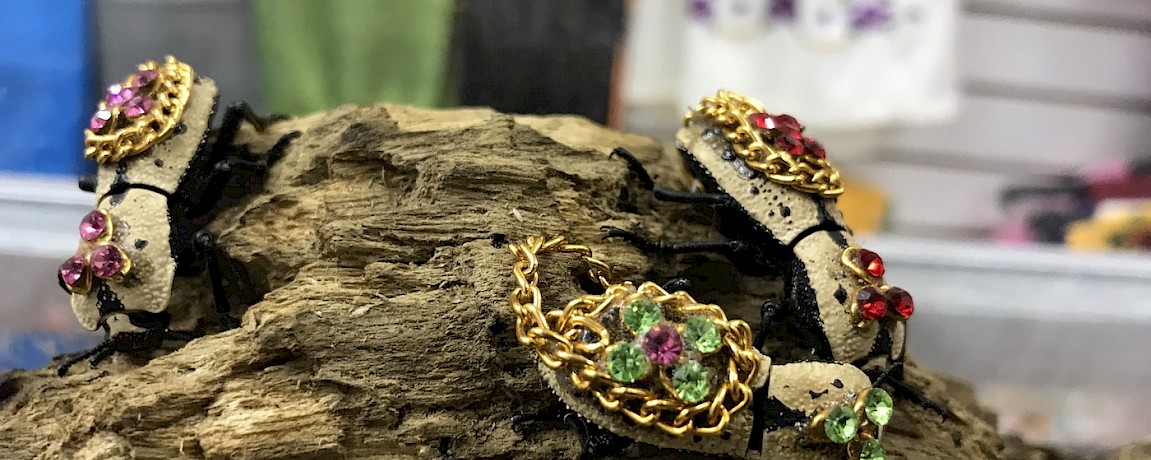


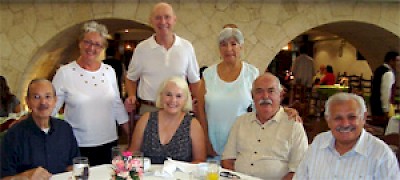
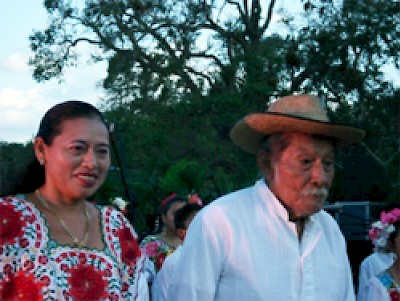
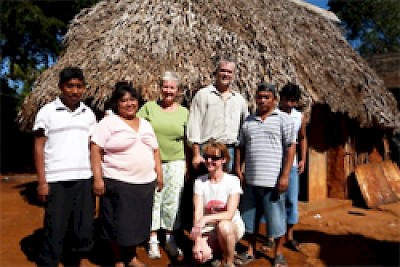
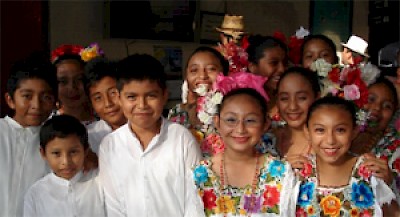
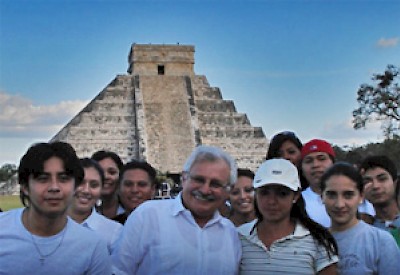

Comments
Nancy H 15 years ago
Incredible article...thank you! I agree with Debbie so I will be forwarding this on to ensure every expat I know is educated!
Reply
Lee Warner 15 years ago
What a wonderful article Joanna wrote!
Unfortunately, I still have 6 more years to wait before I can retire and move to Merida. I was there for a few hours in February and immediately fell in love with the City.
I cannot wait to return to live in Mexico! I lived in Mexico City (el D.F.) for 2 years and Tampico for 6 1/2 years. Moving to Merida would be like returning home again. I love the Mexican people, its customs and a sane pace of life.
Being courteous really takes no effort at all. It is sad that we in the "developed" countries have forgotten basic courtesy. As Ms. Vikki Hillman stated, we chose to move and live in Merida/Yucatan/Mexico. Spanish is spoken in Mexico and it is up to us to learn Spanish, not for the Mexicans to learn English! I thank God that Spanish is another "native" language to me.
Lee
Reply
Laura in Cancun 15 years ago
Oh, and my Mexican friends did NOT like it when I cmmented on the culture's negative aspects (as would be expected), but they were always very patient with answering my questions (which, in their situation, I might not have been).
Reply
Laura in Cancun 15 years ago
Thanks so much for this. I have to admit that when I first moved to Cancun, I was quite the whiner. I thought I knew so much better than everyone here.
Well, they showed me just how wrong I was over the years. Things that used to irk me bc they made no sense, I now see as perfectly logical and oftentimes better than the "American way". (I used to HATE people being late or making me late here, but now I realize how NICE it is not to worry about the time! Just go with the flow, and life seems so much easier.)
I also love the idea of including guests, like you said. It used to annoy me that I had to go up to everyone in a room and kiss them on the cheek. "really? is this necessary?" But 5 years later I see it as a great way to touch base with everyone at the party, and an icebreaker for meeting people you don't know (friends of friends, my cousin's new girlfriend, etc) When I'm visitng in the States, I have to fight the urge not to shake people's hands or kiss their cheeks. It feels weird to just stand there and not acknowledge them now! haha
The one thing I still fail to understand is why the coffee filters are always in the electronics section and not in the coffee aisle... but I'll quit while I'm ahead :)
Reply
Jonna 15 years ago
Joanna, you are marvelous! You not only wrote an absolutely perfect article, you used it to illustrate your point. You put your advice and examples in such a considerate way, just as people should couch their remarks in this very polite society. A perfect example of how to make your point but not be offensive and create ill will.
It's all so true, particularly the part where you are embarrassed by the behavior of a fellow English speaker. Your response was excellent, too often I just cower in my seat and try to disappear.
Reply
Debi 15 years ago
Gracias a todos - YL for inviting, recognizing, and appreciating EXCELLENT guest writers, and Joanna for an being an excellent guest writer. Well done Joanna!
Debi
Reply
Brenda Thornton 15 years ago
I think this is a wonderful and interesting story and it is greatly appreciated.
I would also like to point out to you that the Yucatan appears to be a a very polite society, but I think one needs to point out that many of the Mexicans who have immigrated to the area in which I live in TX do not see any reason to implement or recognize cultural differences here in the United States. One particularly strong problem we have is impaired drinking and driving. I belong to MADD, or Mother's Against Drunk Driving, as I was a Nurse Anesthetist and saw first hand the ravages of drunken driving, and statistically immigrants from Mexico are three times more likely to drive impaired from alcohol as are native born of all races here in the states. When confronted over this, the Mexican immigrants say it is a "cultural" thing. For me, basic safety and respect for human life is not something which should be overlooked as "cultural".
We have to have virtually everything in English and Spanish now, including all government and business paperwork, and the thing which I find the most offputting is that large groups will descend upon businesses and restaurants and they simply seem to ignore their children. The other day, we watched three children from a party wonder all over the restaurant, they climbed under the tables of other diners, and finally, one of them tripped a waiter. My children and my grandchildren are never, ever permitted to disturb other diners or run about in a business place.
It is important to value the culture and the traditions of whichever country one finds oneself visiting or dwelling, but that is a two-way street.
Reply
CasiYucateco 15 years ago
Sometimes, you may become a little tired of saying Buenas Dias o Buenas Tardes o Buenos Noches to all the people you pass and meet. Sometimes, you may think "they don't really care." No, they care. They are listening, even if their own reply is quiet or hastened.
Walking down a hot dusty street one day, a couple of us had to step into the street to pass an elderly gentleman sitting on a rustic stool on his doorstep. He was quite poor, the house in rough condition like his clothing. Nonetheless, both of us said, "Buenas tardes, senor!" (Good afternoon, sir!)
He straighted up, smiled widely and practically shouted in a surprisingly clear voice, "BUENAS TARDES, CABALLEROS!" (Good afternoon, Gentlemen!) with a strong emphasis on the "caballeros."
His smile and cheerful loud greeting made our day. I think 'being recognized and greeted' made his day a little better too.
That's what the Yucatan is about. Help keep the magic and learn the local ways.
Reply
CasiYucateco 15 years ago
Thank you Joanna for a wonderful article, as all have said.
The littlest things matter in Yucatan. It seems odd, but when people remark on the "magical quality of the place" they are often oblivious to the little things that make it that way.
When you walk into a room as a guest, it is typical for previous conversations to stop. Everyone is waiting to be introduced and greeted. But to many northerners, it may seem they've all taken offense to your presence. No one ever stops talking when you walk into a room north of the border. And they certainly don't all turn and stare at you at once. In fact, it is a little uncomfortable, because we don't understand what's going on. Have we offended all of them by arriving? No, but the feeling is there.
Here's what you do, particularly if you have entered alone: Put on your best smile and call out BUENAS NOCHES! (o dia o cual quier cosa - and if you haven't yet learned this tiny bit of Spanish to help you along, Get Started!) Then, go around the room to each person, take their hand gently and speak your name: "Soy Carlos. Mucho Gusto." Ok, Ok, I'll translate: "I'm Charles, pleasure {to meet you}." With women, it is common to embrace them slightly and air kiss a cheek or two. If you know them better, you actually kiss their cheek.
This is the key to entering a room full of local people. Seriously, if you master that, you will have gone a long way to making friends with the citizens of Yucatan.
Reply
Eric Chaffee 15 years ago
I hope this article is long retained in the archives. (I also hope Joanna will correct a small mistake regarding the word 'palatable' where I believe she meant palpable.)
The social graces described in this essay are crucial to understanding between peoples. Joanna has gone a long way towards building neighborliness. Many thanks!
~eric.
http://www.travelblog.org/Bloggers/HatCat/
Reply
Cherie Pi 15 years ago
Joanna's excellent article is always timely wherever one travels or lives. The key word is respect. One reason for moving here is due to the incredible "warmth" of the people. I often shudder to think how Mexicans are received or even greeted in the US. It's a privilege and an honor to live here! Thanks, Joanna!
Reply
« Back (20 to 31 comments)Next »